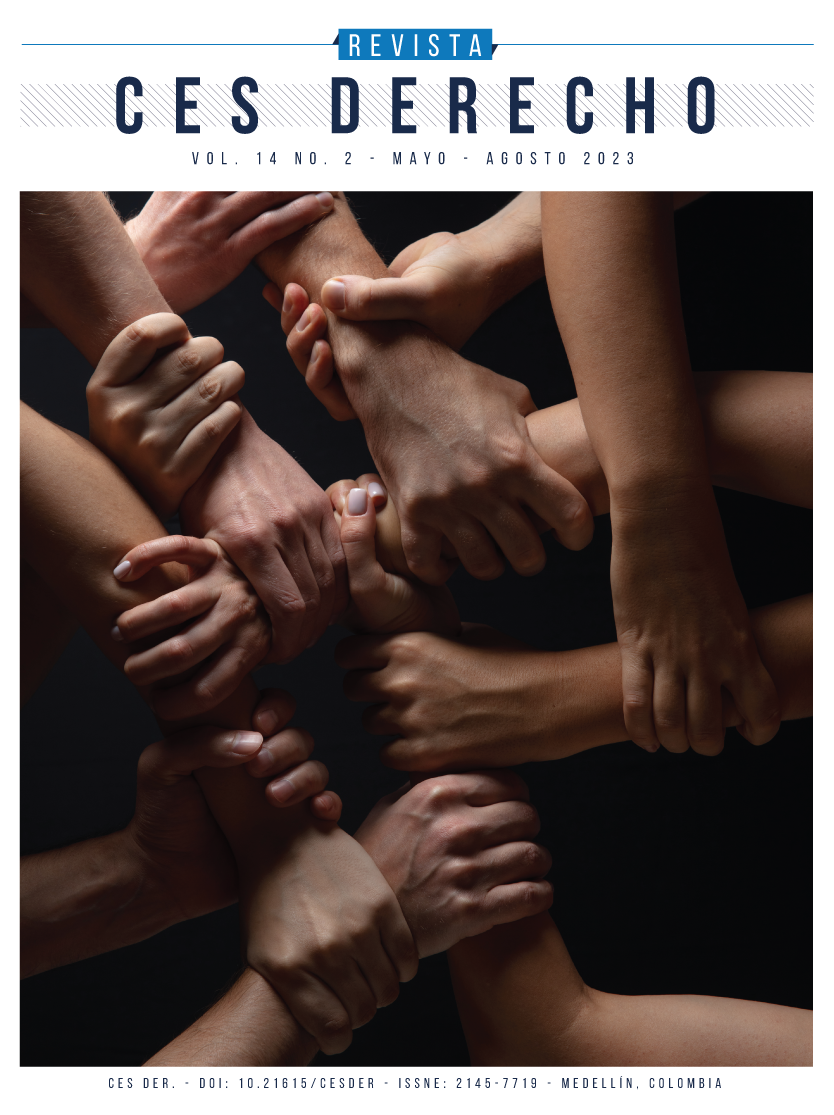Private property: trend of jurisprudential rules in Colombia based on the collision of general interest and particular interest
DOI:
https://doi.org/10.21615/cesder.7250Keywords:
attributes, ecological function, social function, limits, private propertyAbstract
Private property as a factor of power and wealth, whoever owns land can make use of property attributes such as: the use, disposition and enjoyment of assets, the most recent regulations establish: territorial ordering, the social function, the ecological function, the prevalence of the general interest over the private interest and the equitable distribution of the burdens and benefits, have generated limits and restrictions to the right of private property, and as a consequence patrimonial affectations have been made to the owners of the goods since these decrease their market value when they are subjected to the social function or ecological function of private property.
The Political Constitution and the law have generated that private property has legal security in the national order, such as not being affected by subsequent norms or laws as established in article 58, but at the same time this limited constitutional article with the figure of the administrative expropriation that the State can carry out in relation to the fact that the general interest must take precedence over the particular interest of the assets in Colombia, thus achieving that the owner or owner of the asset must part with their right to property for the benefit of the community. A correlational research model is inserted in the article, where the phenomenon is explained, it is about establishing how two variables interact, on the one hand, the phenomenon of the collision of private interest / general interest with respect to private property, thus integrating the correlationality.
Downloads
References
Buenahora Febres-Cordero, J. (2019). La prevalencia del interés general clave para la convivencia y la construcción de democracia. Bogotá: Grupo Editorial Ibáñez, 2019.
Clavijo Cáceres, D., Guerra Moreno, D., & Yáñez Meza, D. A. (2014). Método, metodología y técnicas de la investigación aplicadas al derecho (1 ed.). Bogotá D.C., Colombia: Grupo Editorial Ibáñez & Universidad de Pamplona. Obtenido de: https://biblioteca.ucatolica.edu.co/cgi-bin/koha/opac-detail.pl?biblionumber=79420
Constitución Nacional de 1991. Congreso de la República. Obtenido de http://www.secretariasenado.gov.co/senado/basedoc/constitucion_politica_1991.html
Decreto 2811 de 1974. Congreso de la República. Por el cual se dicta el Código Nacional de Recursos Naturales Renovables y de Protección al Medio Ambiente. Obtenido de http://www.secretariasenado.gov.co/senado/basedoc/decreto_2811_1974.html
Herrera, G. (2006). La función ecológica de la propiedad y de la empresa. Análisis normativo y jurisprudencial. En B. Londoño, G. Rodríguez y G. Herrera (Eds.), Perspectivas del derecho ambiental en Colombia (pp. 96 -131). Editorial Universidad del Rosario.
Ley 3 de 1991. (1991, 15 de enero). Congreso de la República. Por la cual se crea el Sistema Nacional de Vivienda de Interés Social, se establece el subsidio familiar de vivienda, se reforma el Instituto de Crédito Territorial, ICT, y se dictan otras disposiciones. Obtenido de https://www.suin-juriscol.gov.co/viewDocument.asp?id=1558431#:~:text=Cr%C3%A9ase%20el%20Sistema%20Nacional%20de,de%20viviendas%20de%20esta%20naturaleza.
Ley 388 de 1997. (1997, 18 de julio). Congreso de Colombia. Por la cual se modifica la Ley 9ª de 1989, y la Ley 3ª de 1991 y se dictan otras disposiciones. Obtenido de http://www.secretariasenado.gov.co/senado/basedoc/ley_0388_1997.html
Ley 614 de 2000. (2000, 21 de septiembre). Congreso de la República. Por medio de la cual se adiciona la Ley 388 de 1997 y se crean los comités de integración territorial para la adopción de los planes de ordenamiento territorial. Obtenido de http://www.secretariasenado.gov.co/senado/basedoc/ley_0614_2000.html
Ley 84 de 1873. (26 de mayo). Congreso de Colombia. Obtenido de http://www.secretariasenado.gov.co/senado/basedoc/codigo_civil.html
Ley 9 de 1989. (1989, 11 de enero). Congreso de Colombia. Por la cual se dictan normas sobre planes de desarrollo municipal, compraventa y expropiación de bienes y se dictan otras disposiciones. Obtenido de https://www.suin-juriscol.gov.co/viewDocument.asp?id=30039928
Ley 99 de 1993. (1993, 22 de diciembre). Congreso de la Republica. Por la cual se crea el Ministerio del Medio Ambiente, se reordena el Sector Público encargado de la gestión y conservación del medio ambiente y los recursos naturales renovables, se organiza el Sistema Nacional Ambiental, SINA y se dictan otras disposiciones. Obtenido de http://www.secretariasenado.gov.co/senado/basedoc/ley_0099_1993.html
Organización Internacional del Trabajo (OIT). Convenio 169, sobre pueblos indígenas y tribales 1989. Declaración de las Naciones Unidas sobre los Derechos de los Pueblos Indígenas. Obtenido de https://www.ilo.org/wcmsp5/groups/public/---americas/---ro-lima/documents/publication/wcms_345065.pdf
Sentencia C-126 (1 de abril de 1998). Corte Constitucional. M.P. Alejandro Martínez Caballero. Bogotá D.C., Colombia: Referencia: Expediente D-1794. Obtenido de https://www.Corteconstitucional.gov.co/relatoria/1998/C-126-98.htm
Sentencia C-192 (20 de abril de 2016). Corte de Constitucional. M.P. Gabriel Eduardo Mendoza Martelo. Bogotá, D.C., Colombia: Expediente D-10974. Obtenido de https://www.Corteconstitucional.gov.co/RELATORIA/2016/C-192-16.htm
Sentencia C-216 (9 de junio de 1993). Corte Constitucional. M.P.: José Gregorio Hernández Galindo. Bogotá, D.C., Colombia: Ref.: Expediente D-218. Obtenido de https://www.Corteconstitucional.gov.co/relatoria/1993/C-216-93.htm
Sentencia C-389 (1 de septiembre de 1994). Corte Constitucional. M.P.: Antonio Barrera Carbonell. Bogotá D.C., Colombia: Referencia: Expediente D-488. https://www.Corteconstitucional.gov.co/relatoria/1994/C-389-94.htm.
Sentencia C-536 (23 de octubre de 1997). Corte Constitucional. MP. Antonio Barrera Carbonell. Bogotá D.C., Colombia: Referencia: Expediente D-1632. Obtenido de https://www.Corteconstitucional.gov.co/relatoria/1997/C-536-97.htm
Sentencia C-595 (27 de julio de 2010). Corte Constitucional. M.P.: Jorge Iván Palacio Palacio. Bogotá, D.C., Colombia: Referencia: expediente D-7977. Obtenido de https://www.Corteconstitucional.gov.co/relatoria/2010/c-595-10.htm
Sentencia C-677 (18 noviembre de 1998). M.P.: Fabio Morón Díaz. Corte Constitucional. Bogotá D.C., Colombia: Referencia: Expediente D-2070. Obtenido de https://www.Corteconstitucional.gov.co/relatoria/1998/C-677-98.htm
Sentencia T-154 (21 de marzo de 2013). M.P. Nilson Pinilla Pinilla. Corte Constitucional. Bogotá, D.C., Colombia: Referencia: expediente T-2550727. Obtenido de https://www.Corteconstitucional.gov.co/RELATORIA/2013/T-154-13.htm
Sentencia T-384 de (24 de junio de 2014). Corte Constitucional. M.P.: Jorge Ignacio Pretelt Chaljub. Bogotá D.C., Colombia: Referencia: Expediente T- 4.234.421. Obtenido de https://www.Corteconstitucional.gov.co/relatoria/2014/T-384-14.htm
Sentencia T-411 (17 de junio de 1992). Corte Constitucional. M.P.: Alejandro Martínez Caballero. Bogotá D.C., Colombia: Referencia: Expediente Nº T-785Obtenido de https://www.Corteconstitucional.gov.co/relatoria/1992/T-411-92.htm
Sentencia T-536 (23 de septiembre de 1992). Corte Constitucional. M.P.: Simon Rodríguez Rodríguez. Bogotá, D.C., Colombia: Referencia: Proceso de tutela No. 2610. Obtenido de https://www.Corteconstitucional.gov.co/relatoria/1992/T-536-92.htm
Sentencia T-724 (26 de septiembre de 2011). Corte Constitucional. M.P.: Nilson Pinilla Pinilla. Bogotá, D.C., Colombia: Referencia: expediente T- 3065870. Obtenido de https://www.Corteconstitucional.gov.co/RELATORIA/2011/T-724-11.htm
Sentencia T-760 (25 de septiembre de 2007). Corte Constitucional. M.P.: Clara Inés Vargas Hernández. Bogotá, D.C., Colombia: Referencia: expediente T-1398036. Obtenido de https://www.Corteconstitucional.gov.co/relatoria/2007/t-760-07.htm
Downloads
Published
How to Cite
Issue
Section
License
Copyright (c) 2023 CES Derecho

This work is licensed under a Creative Commons Attribution-NonCommercial-ShareAlike 4.0 International License.
| Article metrics | |
|---|---|
| Abstract views | |
| Galley vies | |
| PDF Views | |
| HTML views | |
| Other views | |




